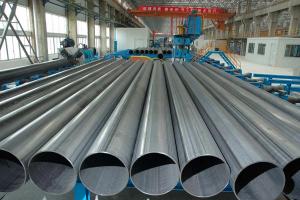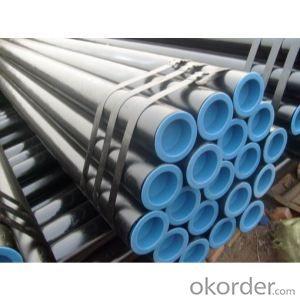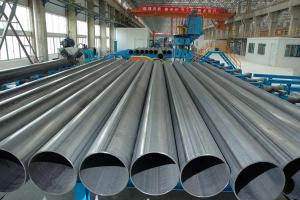API 5L ERW Steel Pipes With Good Quality
- Loading Port:
- Tianjin
- Payment Terms:
- TT or LC
- Min Order Qty:
- 25 m.t.
- Supply Capability:
- 8000 m.t./month
OKorder Service Pledge
OKorder Financial Service
You Might Also Like
1、Structure of High Quality ERW Steel Pipes:
It is made from steel plate.
2、Main Features of the High Quality ERW Steel Pipes:
• High manufacturing accuracy
• High strength
• Small inertia resistance
• Strong heat dissipation ability
• Good visual effect
• Reasonable price
3、High Quality ERW Steel Pipes Specification:
Standard | GB, DIN, ASTM ASTM A106-2006, ASTM A53-2007 |
Grade | 10#-45#, 16Mn 10#, 20#, 45#, 16Mn |
Thickness | 8 - 33 mm |
Section Shape | Round |
Outer Diameter | 133 - 219 mm |
Place of Origin | Shandong, China (Mainland) |
Secondary Or Not | Non-secondary |
Application | Hydraulic Pipe |
Technique | Cold Drawn |
Certification | API |
Surface Treatment | factory state or painted black |
Special Pipe | API Pipe |
Alloy Or Not | Non-alloy |
Length | 5-12M |
Outer Diameter | 21.3-610mm |
Grade | 20#, 45#, Q345, API J55, API K55, API L80, API N80, API P110, A53B |
Standard | ASME, ASTM |
1) Material:20#(ASTM A 106/A53 GRB.API5LGRB,GB),45#,16Mn,10#.
2) Specification range:OD:21.3-610mm,WT:6-70mm,length:6-12m or according to the requirement of clients.
3) Excutive standards:GB,ASME API5L.ASTM A 106/A53,Despite of the above standards,we can also supply seamless steel pipe with standard of DIN,JIS,and so on,and also develop new products according to the requirements of our clients!
4) Surface:black lacquered,varnish coating or galvanized.
5) Ends:Beveled or square cut,plastic capped,painted.
6) Packing:bundles wrapped with strong steel strip,seaworthy packing.
4、Packaging & Delivery
Packaging Details: | seaworthy package,bundles wrapped with strong steel strip |
Delivery Detail: | 15-30days after received 30%TT |
5、FAQ of High Quality ERW Steel Pipes:
①How is the quality of your products?
Our products are manufactured strictly according to national and internaional standard, and we take a test
on every pipe before delivered out. If you want see our quality certifications and all kinds of testing report, please just ask us for it.
Guaranteed: If products’ quality don’t accord to discription as we give or the promise before you place order, we promise 100% refund.
②How about price?
Yes, we are factory and be able to give you lowest price below market one, and we have a policy that “ for saving time and absolutely honest business attitude, we quote as lowest as possible for any customer, and discount can be given according to quantity”,if you like bargain and factory price is not low enough as you think, just don’t waste your time.Please trust the quotation we would give you, it is professional one.
③Why should you chose us?
Chose happens because of quality, then price, We can give you both.Additionally, we can also offer professional products inquiry, products knowledge train(for agents), smooth goods delivery, exellent customer solution proposals.Our service formula: good quality+good price+good service=customer’s trust
SGS test is available, customer inspection before shipping is welcome, third party inspection is no problem.
6、High Quality ERW Steel Pipes Images:
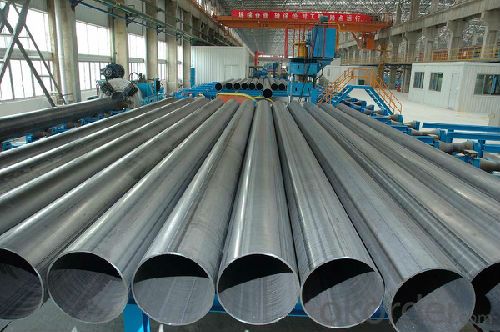
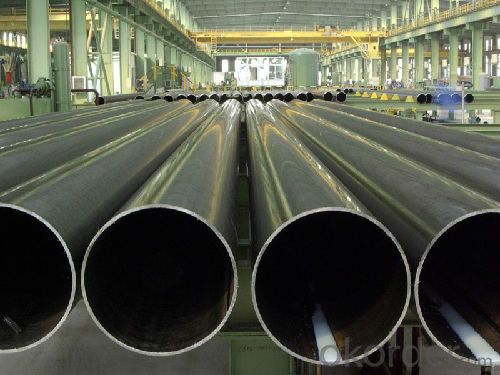
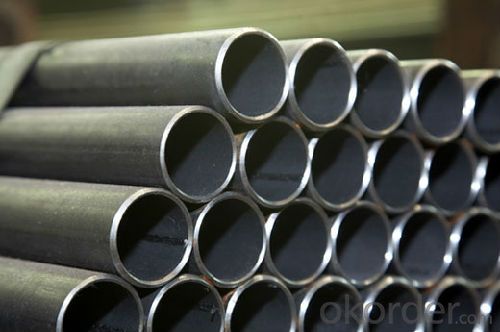
- Q:How do you prevent freezing in steel pipes during cold weather?
- To avoid freezing in steel pipes during cold weather, there are various steps that can be taken: 1. Insulating the pipes proves effective in safeguarding them from freezing. Utilize insulation sleeves or wraps to cover the pipes, especially in areas where they are exposed to low temperatures. Insulation aids in retaining heat and preventing the pipes from reaching freezing temperatures. 2. Identify and seal any air leaks around the pipes that allow cold air to enter. Use caulking or weatherstripping to seal these gaps and prevent the pipes from being exposed to cold air. 3. It is important to maintain a consistent temperature in the vicinity of the pipes. Ensure that the area is adequately heated and insulated. This will help keep the temperature above freezing and prevent the pipes from freezing. In extremely low temperatures, consider utilizing heat tape or pipe heating cables to provide additional warmth. 4. Allowing a small, continuous trickle of water to flow through the pipes can help prevent freezing. The flowing water generates heat and inhibits the formation of ice within the pipes. However, this method should only be used as a last resort due to potential water wastage. 5. If the steel pipes are located in an area that is not regularly used or if freezing weather is anticipated, it may be advisable to completely drain the pipes. Turn off the water supply and open all faucets to allow the water to drain out. This eliminates any standing water that could freeze and potentially cause the pipes to burst. It is crucial to note that prevention is key, as frozen steel pipes can result in expensive damages and water leaks. By implementing these measures, you can safeguard your steel pipes and ensure their functionality during cold weather.
- Q:Can steel pipes be used for conveying abrasive materials?
- Yes, steel pipes can be used for conveying abrasive materials. Steel pipes are known for their durability and resistance to wear, making them suitable for handling abrasive materials. Additionally, steel pipes can be lined with various protective coatings or linings to further enhance their resistance to abrasion and extend their lifespan.
- Q:What are the different coatings used on steel pipes?
- There are several different coatings used on steel pipes, including but not limited to epoxy coatings, polyethylene coatings, zinc coatings, and galvanized coatings.
- Q:Is the steel frame on each floor supporting formwork (floor) called full scaffolding?
- The use of scaffold as its height, when the ceiling height below 3.6M, no matter what the ceiling decoration, decorative scaffolding are calculated
- Q:Can steel pipes be used for conveyor systems?
- Yes, steel pipes can be used for conveyor systems. Steel pipes are known for their strength, durability, and resistance to wear and tear, making them suitable for handling heavy loads and continuous operation in conveyor systems. Additionally, steel pipes can be easily welded, allowing for customization and flexibility in conveyor designs.
- Q:What are the advantages of using steel pipes in irrigation systems?
- There are several advantages of using steel pipes in irrigation systems. Firstly, steel pipes are highly durable and can withstand harsh weather conditions and heavy loads, ensuring a long lifespan. Secondly, they have a high tensile strength, which means they can handle high pressure and water flow rates without the risk of bursting or leaking. Additionally, steel pipes are resistant to corrosion, which is crucial for maintaining water quality and preventing contamination. Lastly, steel pipes are easy to install and maintain, making them cost-effective in the long run.
- Q:Are steel pipes suitable for structural applications?
- Indeed, steel pipes prove to be appropriate for structural applications. Renowned for their strength, durability, and versatility, steel pipes emerge as an ideal choice for diverse structural purposes. They can be utilized in constructions, bridges, stadiums, and other edifices to provide essential support and stability. Steel pipes exhibit remarkable tensile strength, enabling them to withstand substantial burdens and resist deformation when subjected to pressure. Moreover, their resistance to corrosion renders them dependable for structural applications, even in severe environments. The utilization of steel pipes in structural applications is further amplified by their cost-effectiveness and ease of installation. In summary, owing to their strength, durability, versatility, and cost-effectiveness, steel pipes remain a favored option within the construction industry.
- Q:What materials are used in scaffolding pipes?
- Safety net with dense green net, safety net of flame retardant standards GB, and safety net of flame retardant performance detection for lighter lit mesh 12 seconds after leaving the fire, flame retardant, continued burning of not more than 4S. The application of 9MM safety net rope, rope, nylon rope woven, each network should be able to withstand the impact of the national standard 1.6KN test.
- Q:How are steel pipes used in the manufacturing of chemical processing equipment?
- Due to their durability, corrosion resistance, and ability to withstand high temperatures and pressures, steel pipes find common use in the manufacturing of chemical processing equipment. These pipes serve two primary functions within the equipment: as conduits for transporting raw materials and as channels for distributing processed products. Firstly, steel pipes safely and efficiently transport raw materials, such as chemicals and solvents, from storage tanks or external sources to various processing units within the equipment. This ensures accurate and controlled dosage and distribution. Steel pipes are chosen for this task due to their strength, which enables them to handle the high pressures and temperatures associated with chemical processing. Secondly, steel pipes distribute processed products throughout the equipment. Once raw materials have undergone chemical reactions and transformations, the resulting products must be transported to the next stage or collected for further processing. Steel pipes are ideal for this purpose as they can withstand the corrosive nature of many chemicals and the high temperatures encountered during these processes. In addition, steel pipes offer versatility and compatibility with various chemicals and solvents, making them well-suited for use in chemical processing equipment. They can be easily customized to accommodate specific requirements, such as different pipe sizes, shapes, and fittings. This flexibility allows for efficient design and installation, ensuring a seamless flow of materials and products throughout the equipment. In conclusion, steel pipes play a crucial role in the manufacturing of chemical processing equipment by providing a reliable and efficient means of transporting raw materials and distributing processed products. Their durability, corrosion resistance, and ability to withstand high temperatures and pressures make them an essential component in ensuring the safe and efficient operation of chemical processing equipment.
- Q:How are steel pipes resistant to corrosion?
- The corrosion resistance of steel pipes is a result of several factors. Firstly, a protective layer, such as zinc or epoxy, is often applied to steel pipes. This layer acts as a barrier, preventing moisture and corrosive substances from reaching the steel and reducing the likelihood of corrosion. In addition, the composition of steel itself contributes to its resistance to corrosion. Steel is primarily composed of iron, with small amounts of other elements added to enhance its strength and durability. These additional elements, like chromium and nickel, create a natural oxide layer on the surface of the steel. This oxide layer acts as a protective shield, preventing moisture and oxygen from reaching the steel and causing corrosion. Furthermore, steel pipes can undergo a process called galvanization, where a layer of zinc is applied to the surface. This zinc coating provides an extra layer of protection against corrosion, as zinc is highly resistant to rust and oxidation. The zinc layer corrodes sacrificially instead of the steel, thereby extending the lifespan of the pipe. Overall, the combination of protective coatings, the composition of steel, and galvanization processes all contribute to the corrosion resistance of steel pipes. As a result, they are highly durable and suitable for a variety of applications, including plumbing, construction, and the transportation of fluids and gases.
1. Manufacturer Overview |
|
|---|---|
| Location | |
| Year Established | |
| Annual Output Value | |
| Main Markets | |
| Company Certifications | |
2. Manufacturer Certificates |
|
|---|---|
| a) Certification Name | |
| Range | |
| Reference | |
| Validity Period | |
3. Manufacturer Capability |
|
|---|---|
| a)Trade Capacity | |
| Nearest Port | |
| Export Percentage | |
| No.of Employees in Trade Department | |
| Language Spoken: | |
| b)Factory Information | |
| Factory Size: | |
| No. of Production Lines | |
| Contract Manufacturing | |
| Product Price Range | |
Send your message to us
API 5L ERW Steel Pipes With Good Quality
- Loading Port:
- Tianjin
- Payment Terms:
- TT or LC
- Min Order Qty:
- 25 m.t.
- Supply Capability:
- 8000 m.t./month
OKorder Service Pledge
OKorder Financial Service
Similar products
New products
Hot products
Related keywords
